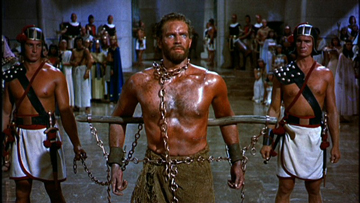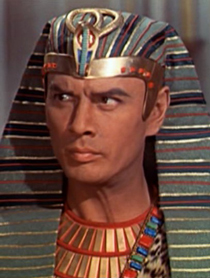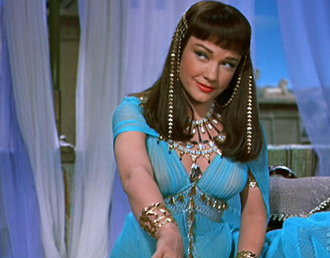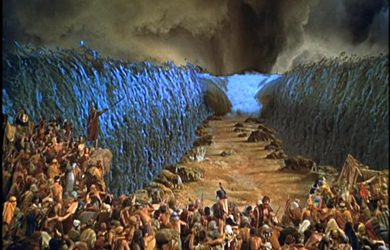
 |
|
|
|
I was taken to see The Ten Commandments in a reissue, maybe in 1960 or so. It seemed the most colorful and loud movie I'd seen to date. I'm not sure that we stayed for the whole picture -- I remember being traumatized by the scene with Pharaoh killing all the newborn babies, and couldn't think about anything else. If this was what Sunday School was about, it all became a lot more scary than I thought. The Ten Commandments is Cecil B. DeMille's last movie, shot in VistaVision and Technicolor. DeMille didn't invent the Biblical drama but he certainly got the most mileage from it. I haven't seen the silent original but I'm told it is excellent. The film is a pageant writ large and bombastic, and performed as if the distinguished cast were trying to work at the level of High School drama.. The writing is incredibly stiff and naïve, as if it were intended for audiences with a 1923 mindset and a grade-school mentality. It's obviously made by someone devout, but the messages are deeply split. The sledgehammer attitude toward reverence is almost intimidating, with DeMille eager to be the stern deliverer of the truth and nothing but the truth in Gospel form. But DeMille spends just as much screen time reveling in his peculiarly repressed, hypocritical interpretation of Biblical Lust. The 'big drama' love scenes are embarrassingly trite. To seal the deal, DeMille brings on an impressive armada of special effects, state-of-the-art for 1956. The epic film is undeniably impressive but strangely primitive. Audiences love it. To many, Charlton Heston is Moses. 
Spokespeople for the film repeat the information that DeMille culled the story of the first 30 years of Moses' life from ancient scriptures. The result plays like a standard "who will inherit the kingdom?" soap opera. Rescued from the bullrushes, Moses (Charlton Heston) is raised in the royal Egyptian household and grows to be the adopted son of Sethi, the Pharaoh (Cedric Hardwicke). As an adult, he clashes with his aggressive half-brother Rameses (Yul Brynner). Moses' loyalty and accomplishments tempt Sethi to name him successor to the throne. Then Moses discovers that he was born a Hebrew, and decides that he must do something about his enslaved people. Nefretiri, the bride-intended of the next Pharaoh (Anne Baxter), at first tries to get Moses to ignore his Hebrew lineage, and when he doesn't, seeks a lover's revenge. Banished from Egypt, Moses finds his destiny on Mt. Sinai: He will be the liberator to lead his people out of Egypt and into the promised land. "Moses. Moses. Moses. Princes of Egypt can't be bothered with such things!" The dialogue in The Ten Commandments alternates between comic-book drivel and grandiose Bible-speak. Every character wears their feelings on their sleeve. Every utterance is a twisted workhorse conveying superfluous exposition, about relationships that should be shown rather than spoken. Over half of the words in this illustrated radio show could be dropped, and all that would be missing is hot air. Known as a great innovator and storyteller of the silent period, Cecil B. DeMille is working in full overblown epic mode. DeMille and his writers have a big chunk of Biblical history to get through, and can't be bothered with subtleties. The old woman saved from being crushed in the construction zone just happens to be Moses' secret mother. Evil Egyptians (Vincent Price's suave master builder) and evil Hebrews (Edward G. Robinson's overseer) lust after nubile Hebrew virgins like (pant, pant) Debra Paget (The Tiger of Eschnapur). Each characters expresses pure emotions and uncomplicated desires, as if shades of personality hadn't yet been invented. Yul Brynner and Charlton Heston fare rather well in their rather obsessed roles. Brynner goes after unwilling bride Anne Baxter with a definite lack of finesse -- on a dramatic level, there are some really hilarious scenes here. Rameses describes how after their marriage he will be able to "make her come to him" at his bidding. Nefretiri taunts him with a juicy kiss, to show him what he won't be getting later on. It's DeMille's silent spoof Why Change Your Wife?, played so straight that it's funny all over again. 
DeMille knows very well the power of the Bible story he is telling, and how deep such stories reside in many of our childhood memories. Without our noticing, the mechanics of one of the species' oldest tales catches us up, and the sheer earnestness of the proceedings begins to take effect. Moses' sojurn among a gaggle of bubbleheaded shepherdesses, all wishing to be his bride, is an awful concoction. But what should be trite or insulting can still get to us. He winds up choosing the fall-down beauty among them, Yvonne De Carlo, because she doesn't throw herself at him. Somehow it seems appropriate. I think stories like this hit us at a different level despite DeMille's questionable approach. Narrative logic is never a problem because the Good Word is behind the main plot points. A tawdry love triangle provides the motivation for most everything in the story, including Rameses' pursuit of the Hebrews to the Red Sea. Poor Yul Brynner can't win, with Charlton glaring at him from one side and sneaky Anne Baxter manipulating him on the other. Rameses should have taken note of how crooked Baxter was in All About Eve Why does Pharoah let Moses stomp around his throne and shout threats at him?. Heston makes demands like a Biblical labor negotiator, with the booming voice of John Carradine backing him up -- boy, that's one perfectly-cast actor. Carradine almost makes up for the cardboard presence of John Derek. DeMille did indeed put together one mighty production. A sizeable company went to Egypt and some fairly gigantic structures were built. A huge portion of the show is bluescreen travelling matte work by the Paramount experts (named above). Matte fringing is everywhere and fast-moving objects sometimes disappear, such as when Rameses hands Moses his walking staff as he abandons him in the desert. On the wide VistaVision screen, some of these composites just look cheap (Nefretiri's barge view) and some are pretty darn impressive, like the setting of a giant obelisk in Sethi's new Treasure City. The engineering for the full scale components of this scene, with workmen using hammers to release a giant counterweight, is awesome. Other special effects tend to be more representational than believable. The animated fire looks terrible -- was Disney's Joshua Meador occupied at MGM animating ray guns for Forbidden Planet? A couple of snake transformations are okay, and the Nile turning blood red is graphically impressive. The famous parting of the Red Sea doesn't look that good, but it is a dramatic high point well-sold by Charlton Heston's booming voice and roaring soundtrack. 
The show is a regular cornucopia of juicy roles. John Derek is a set-upon freedom fighter who line-produces the flight from Egypt for Moses. Martha Scott (Our Town) is Moses' birth mother and Judith Anderson is the slave who knows the secret of the basket in the Nile. There are too many well-known actors to name, but some really odd faces show up. H.B. Warner (an early Christ, I believe, and Mr. Gower from It's a Wonderful Life) is here, and Woody Strode appears in two separate roles. The list of names on the IMDB is pretty impressive: Clint Walker, Gordon Mitchell, Robert Vaughn and Herb Alpert (as a drummer) are in there somewhere as well. The unabashed showman DeMille shows an awful lot of hubris in placing himself so ostentatiously in his own production. He reads his own purple-prose narration over montages. He personally introduces the show like an upscale barker, assuring us that it is a really important story, honest! He betrays his Cold War leanings by telling us that the big struggle in the world is still between Freedom and Tyranny, with Freedom of course meaning the bliss of worshipping a Judeo-Christian God. Anyone looking for subtleties is free to go elsewhere; DeMille's gaudy fairytale version of the scriptures is what much of the world thinks their faith is about. I think the lessons taught by The Ten Commandments aren't particularly devout. Besides the killing of the newborn children, all I remembered from my first screening at age eight was the woman in danger of being squirshed in a pyramid, the blood in the river, and the Red Sea scene. That's not a very spiritual set of messages. Richard Dreyfuss in Close Encounters of the Third Kind probably had the right idea -- his kids couldn't stay up late, so he told them they could only watch the first five commandments. Paramount's Blu-ray Two-Disc Special Edition of The Ten Commandments repeats the format of their previous DVD special editions, with the nearly four-hour feature spread across two Blu-ray discs and given a fat bit rate. The new HD transfer is dazzlingly colorful and sharp. The costumes are fun to look at just in themselves. Elmer Bernstein's soundtrack will fill your TV room. It's obvious that this is a very big restoration job. A package text blurb calls it "Meticulous", which conjures visions of picky and discerning restoration experts being particularly picky and discerning. 
The high resolution shows that special effects were not just used in the scenes with miracles and enormous exterior structures (many of which are real). Blue-screen traveling mattes routinely place actors on Paramount sound stages against massive VistaVision scenery filmed in Egypt. The restoration appears to have minimized blue fringing in the mattes -- sometimes three and four levels of mattes are stacked simultaneously -- with the result that the various elements in a composite image are outlined in black. To rescue some of the more outlandish and artificial illusions in this cut-and-paste approach the effects designers add impressive details. The consistently weak animated fire, for instance, is surrounded by dramatic "glow" effects. The Red Sea composites are made twice as compelling with the addition of brooding, billowing dark clouds. The stormy skies appear to be alive as the clouds plunge into the sea just before the waters part. The Blu-ray does without the older six-part making-of docu, and sticks with a commentary by Katherin Orrison, a set of trailers and a newsreel covering the film's New York premiere. A Limited Edition Gift Set reportedly has 6 discs in all -- 2 each for the Blu-ray and DVD of the 1956 feature, a Blu-ray for the 1923 Ten Commandments and a DVD of all-new bonus features. I was sent a temp DVD of a new docu called Making Miracles included on this second disc. The polished piece contains new interviews as well as good recycled material with Charlton Heston, etc. It's a very thorough docu that approaches DeMille and his movie as if it both were sacred icons. The bottom line is that this new Blu-ray of The Ten Commandments is going to brighten up a lot of homes this year -- the newly-restored transfer encoded on this HD disc is truly impressive.
On a scale of Excellent, Good, Fair, and Poor,
The Ten Commandments Blu-ray rates:
Reviews on the Savant main site have additional credits information and are often updated and annotated with reader input and graphics. Also, don't forget the 2010 Savant Wish List. T'was Ever Thus.
Review Staff | About DVD Talk | Newsletter Subscribe | Join DVD Talk Forum |
| ||||||||||||||||||